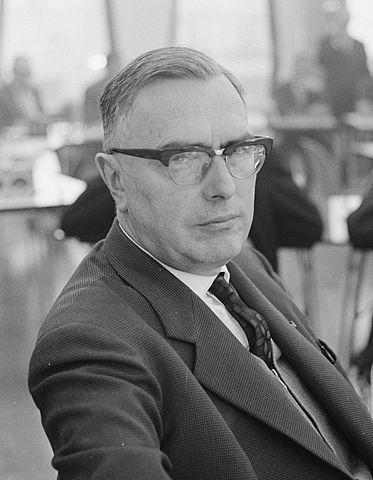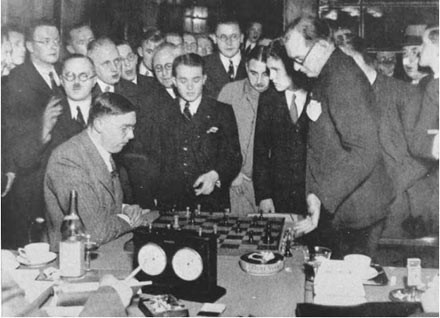
Clash of Champions: Euwe vs. Alekhine
After taking the world championship title from Jose Raul Capablanca in their 1927 match (covered last week), Alexander Alekhine defended his title twice against Efim Bogoljubow: in 1929 and again in 1934.
Like Emanuel Lasker, Alekhine has also been criticized for avoiding his most dangerous challengers -- in his case, taking some measures to avoid a rematch with Capablanca.
In fact, Alekhine was merely asking for the same conditions that Capablanca had wanted for their match -- in particular, that the challenger provide a stake of $10,000, which was the major obstacle. Most likely, the poor economic conditions worldwide during the interbellum period contributed to the top challengers' inability to raise the money to play Alekhine.
Both matches with Bogoljubow were won in one-sided fashion by Alekhine. Alekhine also dominated the top-level tournaments in the early 1930s.
In 1935, he defended his world championship title a third time, against the Dutch player Max Euwe.

Max Euwe (left) and Alexander Alekhine. image via wikipedia
Euwe was born in Amsterdam in 1901. He was an unusual figure in the world of chess -- and especially as a world champion -- simply because he was very normal. He was never really a professional chess player, working instead as a teacher of mathematics and later a computer science professor. He had a family with many children, and as a result did not play in a great many international tournaments.
Perhaps his stature in history is in fact somewhat diminished by his normality. He is seen as a sort of accidental world champion, benefiting from the genius Alekhine's eccentricities -- specifically his drinking and overconfidence.
He lost the world championship back to Alekhine in a rematch two years later. Perhaps, had he been a larger-than-life figure like the previous champions -- instead of a mild-mannered and sane mathematician -- he would have denied Alekhine the rematch and, with the psychological advantage of the champion's crown on his head, gone on to be seen as one of the greats.
After all, Alekhine was considered even more of an underdog against Capablanca than Euwe had been seen as before the match with Alekhine.

Euwe is best-known as one who took rigorous opening analysis to a new level; in that way, he is seen as a forerunner to Mikhail Botvinnik. While older players also analyzed the opening (especially Alekhine himself), Euwe went even deeper, beyond the opening per se and into the middlegame.
His chess was distinguished by mental steadiness and the logic of a mathematician; for these reasons, he was a particularly dangerous opponent for the careless and unsteady but brilliant Alekhine -- something which was not really anticipated by those who saw Alekhine as a big favorite.

Unlike the Alekhine-Capablanca match of 1927, this match was not played until a certain number of victories, but rather until 30 games. Whoever was ahead after 30 games would be the victor.
The match took place in Holland, with the players traveling between 13 different cities. Alekhine quickly took a three-point lead, and for a long time it looked as though the widely expected result would occur.
By winning the 10th, 12th, and 14th games, Euwe drew even, but Alekhine quickly reestablished his lead by winning the 16th and 19th games.
We will see the 20th game, where a complicated endgame struggle took place. This was the turning point of the match -- with it Euwe began a run of four wins without Alekhine winning any, which essentially decided the match.
The opening went Euwe's way, and he went into the endgame a pawn up. However, Alekhine had counterplay, and Euwe made the right decision to give back the pawn in order to increase the activity of his own pieces. Now the black bishop is caught in a pin on the a-file. However, in order to win the game, White must absolutely find Euwe's next move. Before going ahead, try to find it yourself.
After this game, Euwe won the very next game from the same opening (with reversed colors), thus equalizing the match score. Three draws followed, after which Euwe won two games in succession.
Alekhine won in the 27th game of the match, but could not win another game -- the last three were drawn, with Euwe granting Alekhine a draw in a completely won position in the last game of the match, since a draw was sufficient to win the title.
Thus Max Euwe became the fifth world chess champion. Next week we will see a game from the rematch in 1937.
RELATED STUDY MATERIAL
- Read the previous article in this series, Alekhine vs. Capablanca.
- Watch GM Melikset Khachiyan's video on the technique of calculation, featuring a game by World Champion Euwe.
- Play a match between Alekhine and Euwe in the Chess Mentor.
- Practice your world-championship-level combinations in the Tactics Trainer.
- Looking for articles with deeper analysis? Try our magazine: The Master's Bulletin.



